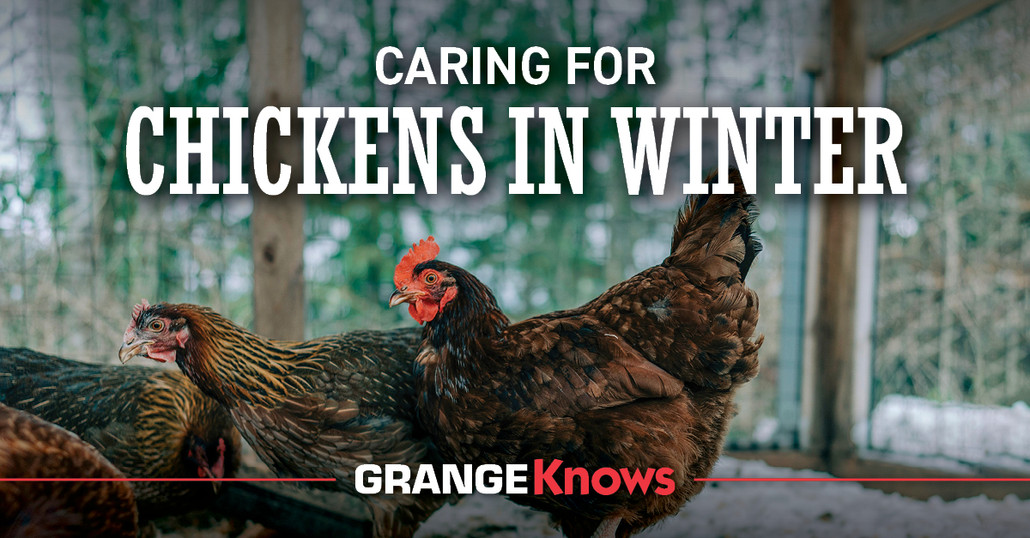
Caring for Chickens in the Winter
Posted by Grange Co-op on 30th Jan 2024
Winter can be a challenging time for poultry owners, as the plummeting temperatures pose a threat to the well-being and productivity of their feathered friends. However, with proper winterization strategies, you can ensure your chickens not only survive but also thrive during the colder months.
Let's dive into the key aspects of winter chicken care, from using heat lamps to adjusting lighting, preventing water from freezing, creating a comfortable environment, and maximizing the benefits of the chicken run.
Maintaining Warmth in the Chicken Coop
Chickens, like many other animals, thrive in moderate temperatures. Ensuring that your chicken coop stays warm is paramount to the well-being of your flock during the winter months. Inspect the coop for any drafts or gaps that might let cold air in and fix them promptly. Consider adding weather-stripping to doors and windows to create a snug environment.
Strategic placement of the coop is also crucial. Choose a location that minimizes exposure to harsh winds and captures the sun's warmth during the day. Adding extra insulation to the walls and ceiling can help retain heat, providing a cozy haven for your chickens.
Strategic Use of Heat Lamps
Supplementing the coop's natural heat with additional warmth is necessary in extreme cold conditions. This is where heat lamps come into play. Placing the heat lamp off to one side of the coop allows chickens to regulate their temperature effectively. This creates a gradient within the coop, allowing your flock to move closer or farther away from the heat source as needed. This simple adjustment promotes a comfortable and stress-free environment for your chickens.
Ensure the lamps are safely secured to prevent any fire hazards. Aim for a consistent and moderate temperature, as sudden fluctuations can be more harmful than a steady chill.
It's important to note that while heat lamps are beneficial, they should be used judiciously. Chickens are surprisingly resilient to cold temperatures, and providing too much heat can disrupt their natural acclimatization process. Monitor your flock's behavior to gauge their comfort level and adjust the heat lamps accordingly.
Proper Lighting for Egg Production
Winter's shorter days can have a significant impact on egg production. Chickens require a certain amount of daylight to stimulate egg laying, and the reduced sunlight during winter can disrupt their natural laying cycle. To counteract this, consider supplementing the natural light with artificial lighting.
Install a timer-controlled light in the coop to extend the hours of light. Aim for 14 to 16 hours of light daily, including natural and artificial sources. This extended lighting period will help maintain consistent egg production, ensuring a steady supply of fresh eggs throughout winter. Be mindful of the color temperature of the light, opting for a warm hue to create a natural and comfortable environment for your chickens.
Preventing Water Freezing
Keeping your chickens hydrated during winter is crucial for their health and well-being. However, freezing temperatures can quickly turn water into an ice block, making it inaccessible to your flock. Invest in heated or automatic waterers that turn on and off as needed to prevent this issue. These devices eliminate the need to break the ice in the water trough daily and ensure your flock stays adequately hydrated.
Place the water containers in a sunny spot within the coop to harness the sun's warmth during the day. Alternatively, use insulated water containers or wrap existing containers with insulating materials to retain heat. Replacing frozen water with fresh, warm water will ensure your chickens are constantly supplied, preventing dehydration during the colder months.
Significance of a Well-Insulated Chicken Run
While the chicken coop is their primary shelter, don't underestimate the benefits of a well-designed chicken run during winter. Use windbreaks or temporary barriers to ensure that the run is adequately protected from harsh winds. This will create a more comfortable space for your chickens to roam and exercise.
Consider covering a portion of the chicken run with clear plastic or a tarp to create a sheltered area where they can enjoy the outdoors without being directly exposed to the elements. This provides mental stimulation for the chickens and encourages physical activity, contributing to their overall winter well-being.
Benefits of Deep Bedding
In addition to providing warmth through a heat lamp, creating a cozy environment within the chicken coop is essential for your flock's heal. Implement deep bedding techniques using thick layers of straw or pine shavings to insulate the floor and provide extra warmth. Deep bedding not only acts as an additional layer of insulation but also absorbs moisture, keeping the coop dry and preventing respiratory issues in the chickens.
Regularly check and refresh the bedding to maintain cleanliness and comfort. Adequate ventilation is also crucial, as it prevents moisture accumulation without compromising the coop's warmth. Proper ventilation helps keep the air fresh and reduces the risk of respiratory illnesses in your chickens.
Preparing for Winter with Grange Co-op
As you embark on winterizing your chicken coop, trust Grange Co-op to provide the essential products you need. Explore our range of chicken coops, quality beddings, and heated waterers, ensuring your flock thrives even in the coldest months. Our commitment to the agricultural community extends beyond products; rely on our knowledgeable advice to make your winter preparations seamless. Keep your chickens warm, happy, and productive with Grange Co-op.
